I mean back in the day, before we all walked around with glass bricks in our pockets that contained every piece of information that's ever been available and allowed us to connect with anyone anywhere in the world in real time. What did people from more than 100 years ago think our future might look like?
That was the question posed to French commercial artist Jean-Marc Côté in 1899. Côté and his team were commissioned to create a series of cards to commemorate the 1900 world's fair, "Exposition Universelle," in Paris, featuring images of how the world might look in the then-distant future of the year 2000. Sadly, the company that commissioned the project (which was likelyeither a toy or cigarette manufacturer) went out of business before the cards could actually be distributed, and the images remained out of print until author Isaac Asimov rediscovered and published them with accompanying commentary in 1986.
But now that we've lived through that fantastical future, how did these predictions turn out? Let's just say there was, um, a lot of creativity on display. Which is enough to make even the most flawed of these forecasts — of which there are many — even more fascinating to think about today.
Here are 11 delightfully inaccurate visions of the year 2000, according to artists from the late-19th century:
1. Prediction: Firefighters will fly around with batwings on.
This one didn't pan out ... unless maybe Côté was just trying to predict the creation of Batman?
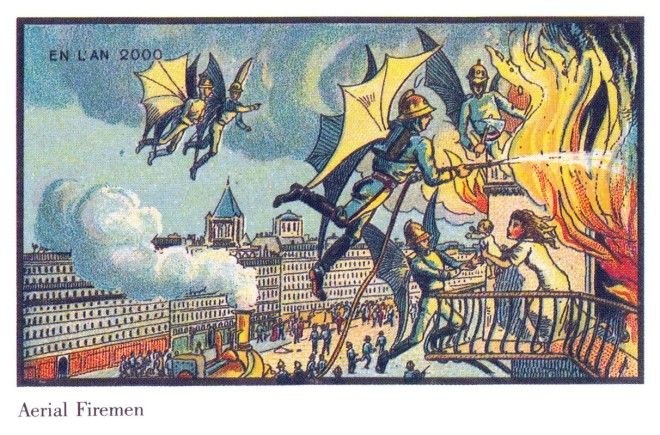
2. Prediction: We'll all travel across the Atlantic in these sweet-lookin' blimp-boats.
Again, not spot on ... although to be fair, I'd prefer this to ever flying standby again.
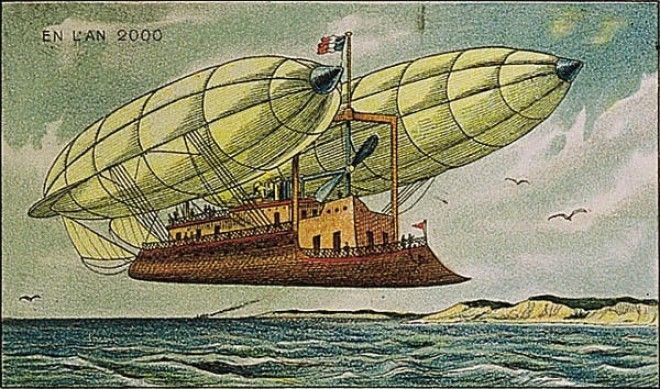
3. Prediction: We will domesticate whales and use them as transportation.
Nope. If only we'd spent half of the 20th century training whales instead of killing them.(Although there is that dolphin chillin' there, and dolphin-assisted childbirth is a thing that exists in the 21st century, for better or for worse.)
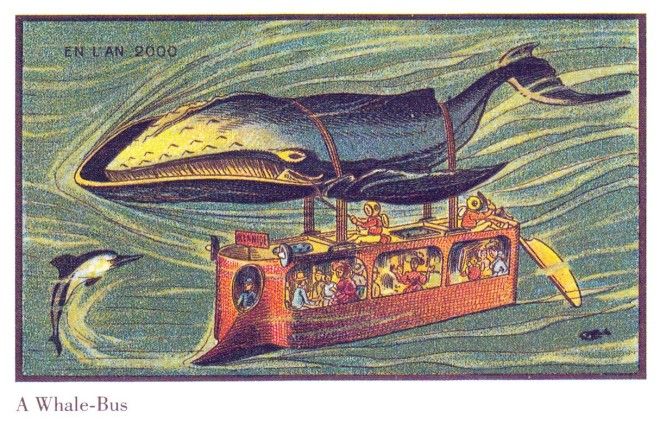
4. Prediction: We will also domesticate giant mutant seahorses.
There's a slight chance all this weird aquatic stuff was their way of warning us about the impending threat of sea-level rise from climate change. Either that or they were warning us about the general existence of Aquaman.
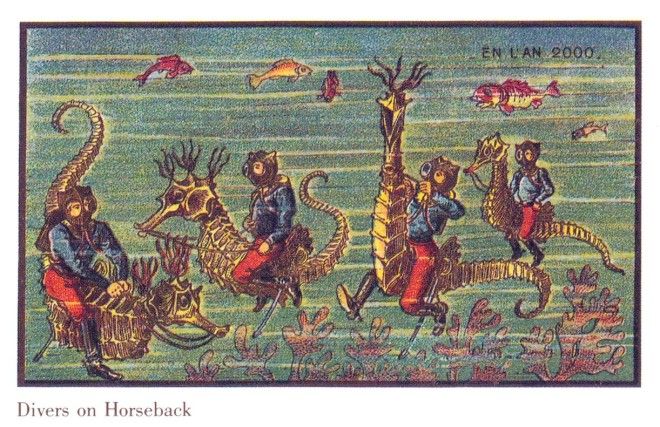
5. Prediction: We'll be hunting seagulls ... from underwater?
Not so correct. But maybe I'm wrong, and we've been overlooking the nutritional value of seagulls for the last century. (Also, why is that woman swimming in a dress?)
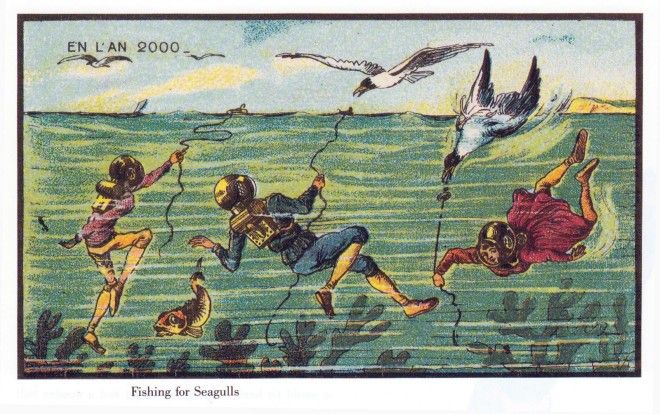
6. Prediction: Flying cars will be a thing.
While this image does resemble the traffic outside the Paris Opera just before showtime, our automobiles are unfortunately still stuck on the ground. It does go to show, however, that humans have been obsessed with the idea of flying cars for a long time.
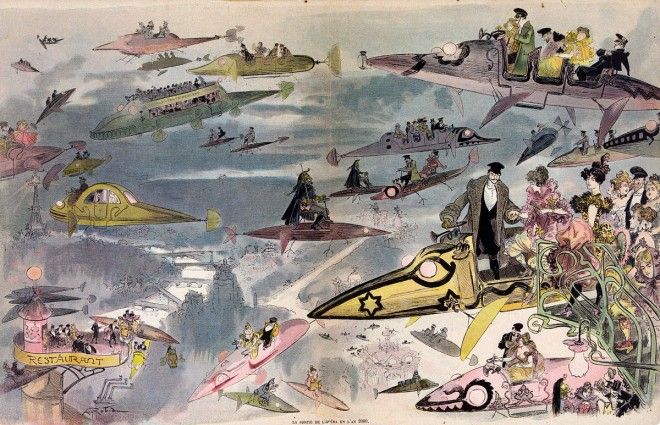
7. Prediction: Aerial wing-flapping hover cars will be our key mode of transportation.
Although perhaps it's only a matter of time until "Uber for aerial wing-flapping hover cars" becomes a thing.
Hopefully, by the time this happens, that orange aerial wing-flapping hover car on the right will learn how to fly without slicing her wings through the other aero-cabs on the stand.
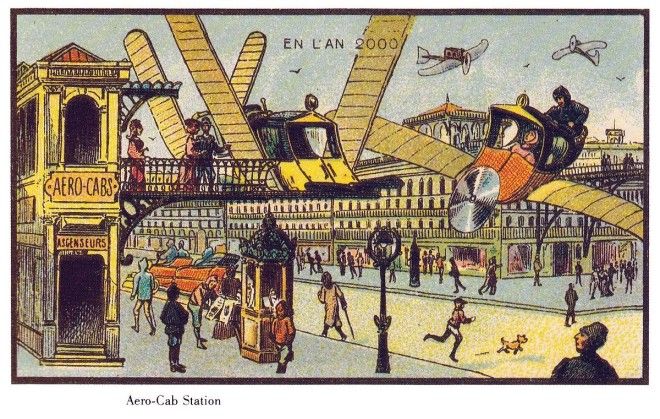
8. Prediction: Automated bathrooms will make our lives much easier.
As clever as today's smart homes are, we still haven't quite figured out how to create a fully-automated bathroom like this. The few failed attempts that have been made at creating robot lipstick applicators were all much less elegant, and much less steampunk.
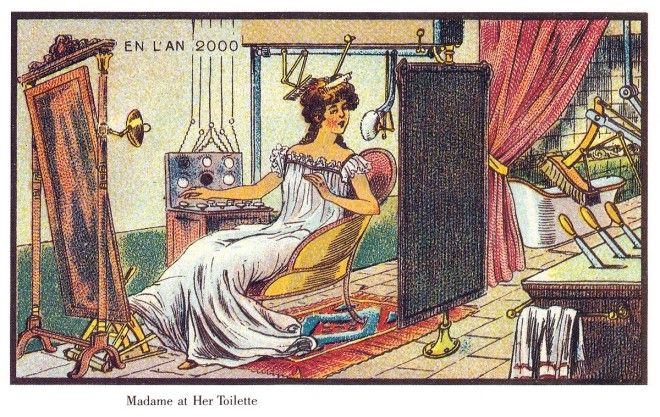
9. Prediction: Our hardworking barbers and salon specialists will be replaced by robots.
I'm OK with this one not panning out because I'm just not ready to trust an automated tree of spider arms to use sharp objects near my head.
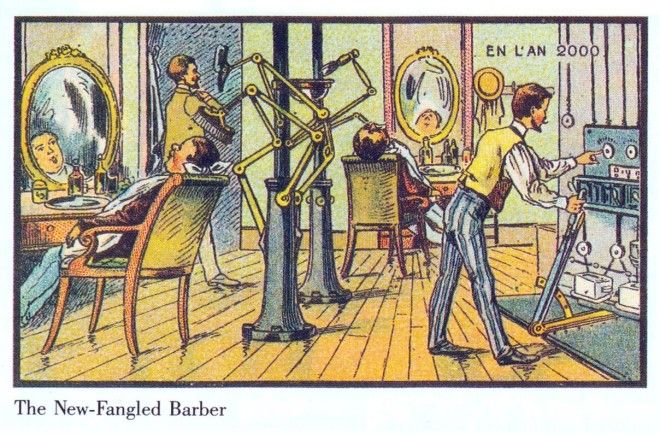
10. Prediction: Our education system will become waymore high tech.
While this one is utterly incorrect on a literal level, the image itself works pretty well as a metaphor for our modern education system. Whether that's a good or a bad thing is entirely up to you. (Although we do have EEG technology today, which isn't so different from those helmets...)
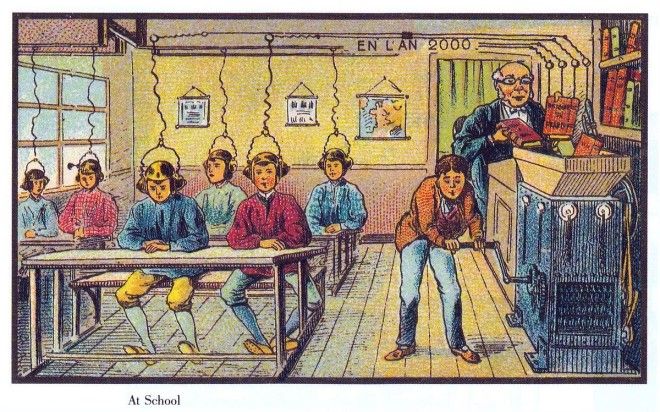
11. Prediction: radium.
That's scary. It might help if you wanted to breed a race of ginormous seahorses ... but probably isn't safe to keep in the fireplace as your main source of heat.
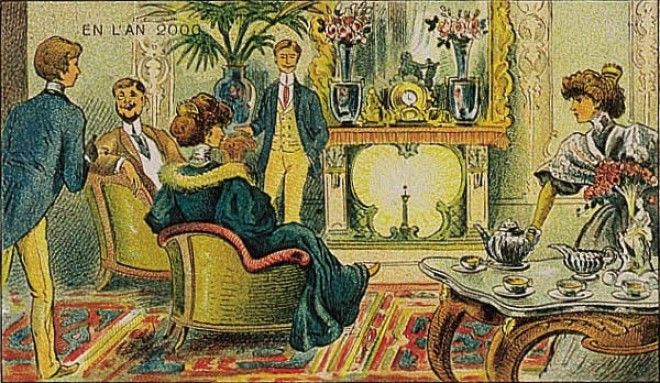
Not all of these future visions were as ridiculously off-the-mark as the ones above though.
In fact, here are three more that were downright prescient.
1. Prediction: We'll communicate via video chatting.
They totally called the invention of FaceTime/Google Hangouts/every other video chatting service that I use on a daily basis.
To be honest, I kinda wish I had a holographic phonograph setup like this. It's way cooler than just staring at my laptop screen all day. (Also I wish I had a sweet mustache like these dudes.)
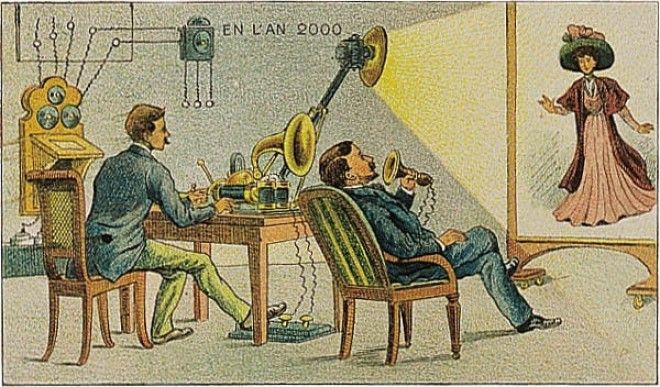
2. Prediction: We'll see the rise of a mobile society that's not locked into a single location.
Sure, on an overly-literal level, this is basically just a glorified mobile home — which is kind of ironic considering how mobile homes in America are more commonly associated with lower incomes than the wealth that this image depicts.
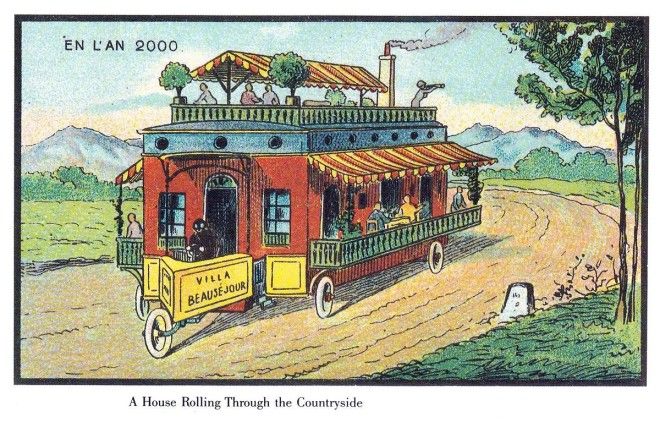
But more importantly, images like this — and the one below, which accurately predicts the rise of electric trains that have helped to enable more public mass transportation — show that these French thinkers were looking forward to a more adaptable and international society. Telecommuting, remote offices, cross-continental teleconferencing, even the idea of transient living through AirBnB — that's where we are today, and it's exactly where we wanted to be at the turn of the 20th century. And that's pretty freaking cool!
(There's also probably an argument to be made that this electric train suggests a greener and less coal-dependent future, which is cool too.)
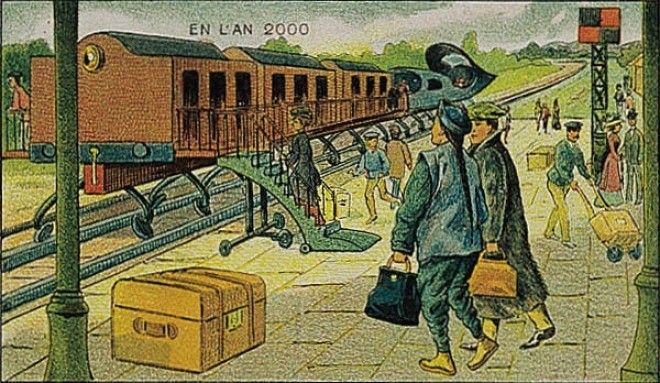
3. Prediction: The future will be full of automated industry.
Today, automation and industrialization can be touchy subjects. Are they responsible for job loss? Do they rely too much on questionable cost-cutting practices, such as artificial ingredients and other structural shortcuts?
Those are all important issues to address. But the future portrayed in these images reminds us of the inherent optimism of industry and progress — something that's all too easy for us to ignore today.
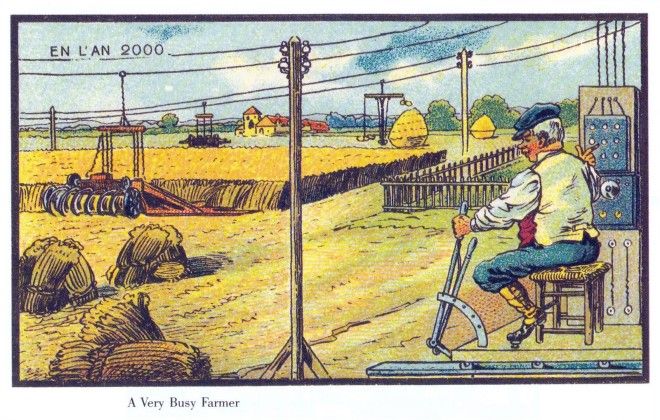
See how happy this guy is? He's not freaking out over (and alternately consuming) pesticides and chemicals for the sake of mass production. He's got a big ol' farm, and technology is helping him to make more stuff — and make it fast, so he can sell it and make money and support his family and all that good stuff we like to talk about when we talk about jobs.
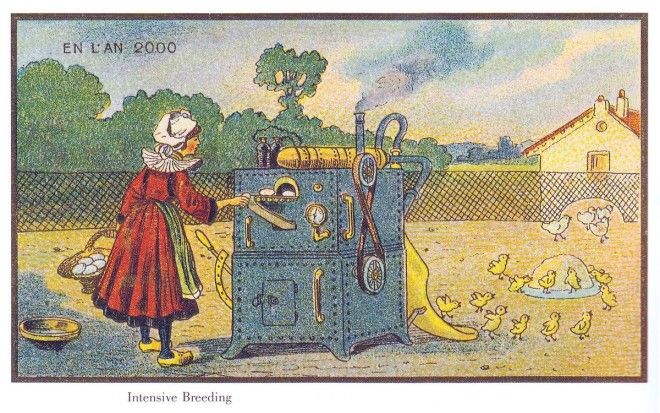
Sure, maybe modern factory farming does deserve its less-than-stellar reputation. But at the same time, it's all too easy for us to forget the amazing headway in the creation of life. Now, we can even 3D print ovaries to induce fertility. Think about how amazing that would have seemed in 1899.
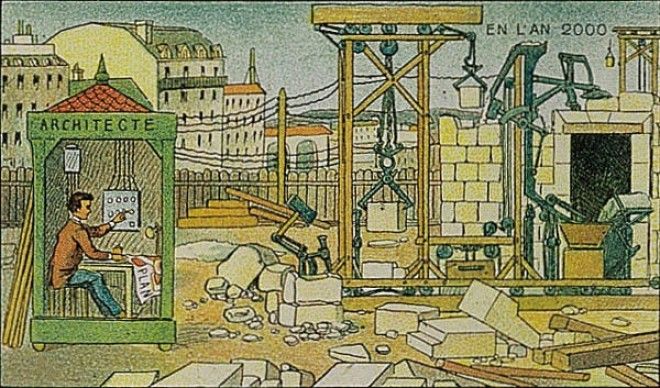
And on that note, maybe we should also celebrate the fact that we can 3D print a freaking house today. For all the very real problems that we face in the modern world, technology like that still makes a major difference in a lot of people's lives.
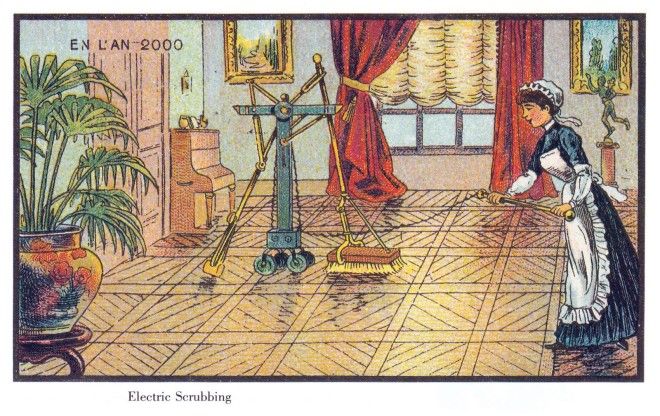
Also these brilliant French futurists clearly foretold of the rise of the almighty Roomba, which is just wonderful on so many levels.
As fun as it is to look and laugh at the imagined futures of the past, this is also a really cool way of evaluating where we are today — and where else we need to go.
It's kind of like writing out your own personal five-year plan ... envisioning the future still makes it easier for us to map out how to get there. Sure, it might not look exactly as you'd hoped — after all, you can't predict every random roadblock you might hit along the way. But it still helps to have some idea of where you're going.
The future is happening all around us, every single day — sometimes so much and so fast that we don't even notice.
Between improving factory farm conditions and domesticating those giant radioactive seahorses, there's obviously still a lot to be done.
Instead of letting ourselves become jaded with the growth we take for granted, maybe this is evidence that we should all try to look back at where we came from, evaluate and celebrate just how far we've come, and figure out a plan to keep moving forward.

